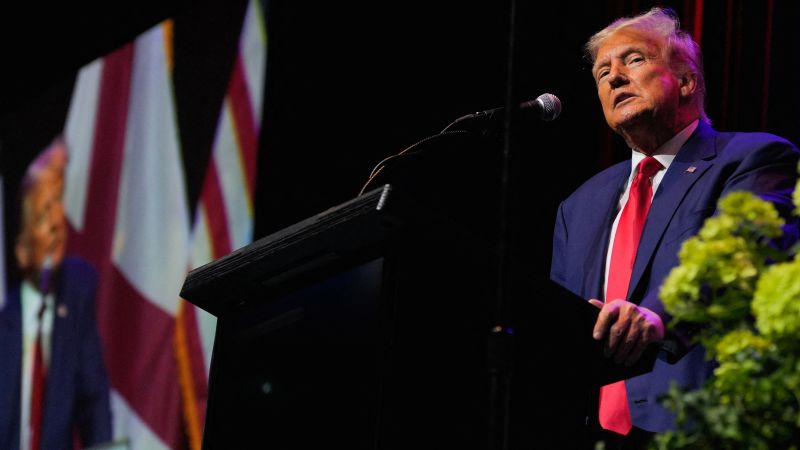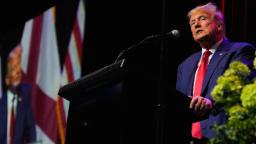CNN
—
Special counsel Jack Smith asked a judge to quickly set limits on what Donald Trump’s team can do with the evidence that will be shared with them in the election subversion case against the former president.
In a Friday night court filing, prosecutors pointed to a Trump Truth Social post from earlier in the day to argue that the former president has a habit of speaking publicly about the details of the various legal proceedings he’s facing.
The disclosure rules they have proposed, they said, are “particularly important in this case because the defendant has previously issued public statements on social media regarding witnesses, judges, attorneys, and others associated with legal matters pending against him.”
“And in recent days, regarding this case, the defendant has issued multiple posts—either specifically or by implication—including the following, which the defendant posted just hours ago,” the special counsel’s office wrote, including a screenshot of the Truth Social post from Trump that read: “IF YOU GO AFTER ME, I’M COMING AFTER YOU!”
A Trump spokesperson responded in a statement early Saturday morning, saying the former president’s post was “the definition of political speech” and not related to matters of the case.
The prosecutors argued that if Trump “were to begin issuing public posts using details—or, for example, grand jury transcripts—obtained in discovery here, it could have a harmful chilling effect on witnesses or adversely affect the fair administration of justice in this case.”
Among the restrictions the prosecutors are requesting is a rule barring Trump’s lawyers from providing copies to Trump of discovery materials deemed “sensitive,” which include grand jury materials and witness interviews. The former president is allowed to be shown such materials, under the rules proposed by the prosecutors, however, he would be barred from taking down any personal identifying information from the documents.
The filing said that the order the special counsel is seeking “is consistent with other such orders commonly used in this District and is not overly restrictive.”
It’s not unusual for criminal cases to have non-disclosure provisions placed upon them early on, though Trump’s two federal criminal cases have made the typically quick process where prosecutors and defense lawyers agree on terms more adversarial. In the separate federal criminal case against him in Florida, prosecutors and Trump’s defense lawyers are still split on how and where he can discuss classified information.
As part of Thursday’s court proceedings for Trump’s first appearance in the case, Magistrate Judge Moxila Upadhyaya sought to remind him “that it is a crime to try to influence a juror, or to threaten or attempt to bribe a witness or any other person who may have information about your case, or to retaliate against anyone for providing information about your case to the prosecution.”
Smith’s team is also making the unusual request of asking the judge to impose the proposed discovery disclosure rules before allowing Trump’s lawyers to weigh in themselves with a court filing. To explain why they were seeking such a maneuver, prosecutors outlined the back-and-forth they had behind the scenes with the Trump team over their proposed order. And they pointed to comments Trump’s attorney John Lauro made at his arraignment Thursday stressing that the defense would not be able to propose a trial date or expected length, as the judge has requested, until they had a chance to review the scope of evidence involved in the case.
Smith’s filing said that once US District Judge Tanya Chutkan approved their proposed protective order, prosecutors could begin turning over “a substantial amount of discovery” to the defense. The prosecutors argued that if Trump wanted to change the restrictions she approved, he could come back to the court to ask for the order to be modified.
Trump pleaded not guilty Thursday in a Washington, DC, courthouse to four charges brought against him days earlier by Smith – including conspiracy to defraud the United States – as part of his investigation into efforts to overturn the 2020 election leading up to the January 6, 2021, attack on the US Capitol.
On Friday evening, he delivered an unusually short speech at a fundraiser hosted by the Alabama Republican Party that focused heavily on his legal issues in the wake of his arraignment.
The former president railed against the federal criminal charges at his first campaign event since being indicted a third time.
“The fake charges put forth in their sham indictment are an outrageous criminalization of political speech. … They’re trying to make it illegal to question the results of a bad election. It was a very bad election,” Trump, who refuses to accept he lost the 2020 election and regularly promotes election conspiracy theories, told the crowd in a roughly 50-minute speech.
Trump touted his lead in the polls over his GOP 2024 rivals and argued the indictments were only giving him a boost.
“Every time they file an indictment we go way up in the polls. We need one more indictment close out this election. One more indictment and this election is closed out, nobody has even a chance,” Trump said.
The former president told the crowd that “the only civil rights that have been violated in this matter are my civil rights,” and he again vowed political retribution if he were to win the 2020 election, including a special prosecutor to investigate claims related to President Joe Biden.
This story has been updated with additional reporting.

